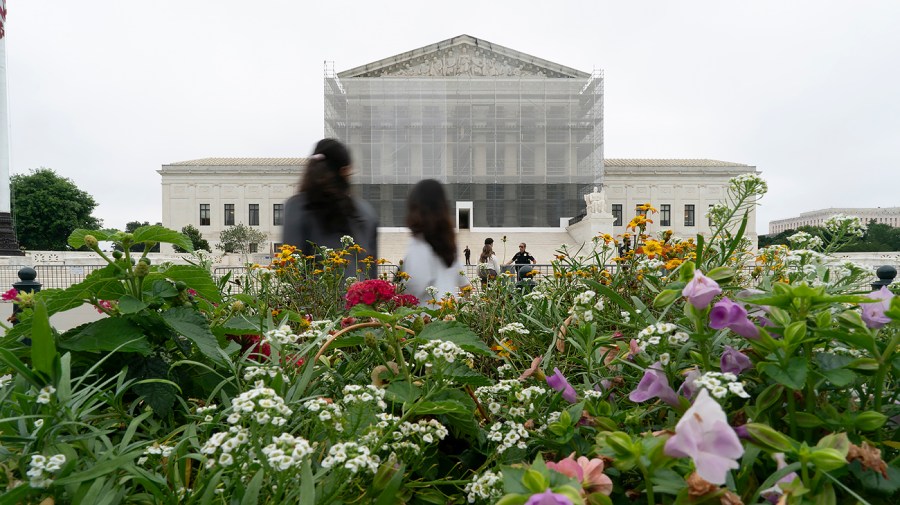The Supreme Court’s recent decision concerning nationwide injunctions has sent ripples through the legal community, posing a significant challenge to those opposing former President Trump’s policies. The ruling, which emerged from a case on birthright citizenship, curtails the use of injunctions that previously halted the implementation of certain policies across the United States, signaling a potential shift in judicial strategy.
While Republicans celebrated the decision, viewing it as a victory for the Trump administration, the implications extend far beyond a single case. The Supreme Court has directed lower courts to narrow their nationwide injunctions, ensuring they are no broader than necessary to provide complete relief to the 22 states and immigration groups involved in the lawsuit. This decision opens the door for the Trump administration to potentially enforce its birthright citizenship policy in regions not covered by the injunction, although the policy’s legality remains unresolved and likely to return to the court.
Implications for Nationwide Injunctions
The ruling’s impact on nationwide injunctions has not gone unnoticed by legal experts and policymakers. In a swift response, Trump highlighted the decision as a precedent for other policies he hopes will receive similar judicial treatment. “The decision signals the loss of one of the best tools lawyers have had in their arsenal for dealing with this administration’s constitutional excesses,” noted Joyce Vance, a law professor and former U.S. attorney.
Republicans have long criticized nationwide injunctions, arguing that they allow district court judges to overstep by blocking policies deemed unlawful. Conversely, Democrats argue that the increase in such injunctions reflects the questionable legality of many Trump-era policies, often implemented through executive orders. The birthright citizenship case, in particular, serves as a critical example for those advocating the necessity of nationwide injunctions to prevent a fragmented legal landscape.
Legal and Political Reactions
Beyond the birthright citizenship case, nationwide injunctions have played a crucial role in other legal battles against Trump administration policies. Trump himself expressed optimism that the ruling would enable the administration to advance numerous policies previously halted by nationwide injunctions, including those related to sanctuary city funding and refugee resettlement.
However, the ruling does not eliminate nationwide injunctions entirely. Judges are advised to reserve such measures for cases where they are the sole means of providing complete relief. This shift is likely to encourage litigants to pursue class-action lawsuits, a more complex and time-consuming approach with its own set of challenges.
“There are very rigorous requirements for class actions in this country, including commonality and all sorts of legal requirements that require lead plaintiffs to be representative of entire classes,”
remarked Ankush Khardori, a former federal prosecutor. He criticized the Supreme Court’s stance, arguing that it fails to consider the practical difficulties of pursuing class actions in a rapidly evolving legal environment.
Historical Context and Future Outlook
The debate over nationwide injunctions is not new, but it has intensified during the Trump administration. Critics from both sides of the political spectrum have accused the judiciary of activism, with judges appointed by presidents from both parties ruling against the administration. Justice Amy Coney Barrett, writing for the majority, emphasized that courts should not overextend their power, even when the executive branch is deemed to have acted unlawfully.
Justice Sonia Sotomayor, in her dissent, accused the majority of succumbing to the Trump administration’s strategic maneuvering. She argued that the administration’s narrow legal questions avoid addressing the broader constitutional issues at stake.
The Supreme Court has temporarily halted the implementation of Trump’s birthright citizenship order for 30 days, leaving its future uncertain. Legal experts like Khardori criticize the court for neglecting the practical implications of its decision, while advocates like Tianna Mays of Democracy Defenders Action remain committed to seeking injunctions where necessary.
“It cuts both ways. Right now, folks are jumping up and down on one side saying, ‘Oh, this is great. It’s going to stop all these things,’”
Mays observed, highlighting the potential for the ruling to impact future administrations, including those of President Biden.
As the legal community grapples with the ruling’s consequences, the debate over the role of nationwide injunctions in American jurisprudence continues. The decision marks a pivotal moment in the ongoing struggle between executive power and judicial oversight, with far-reaching implications for future administrations and their ability to implement policy unimpeded.
